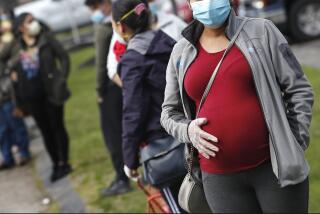Epilepsy drug in pregnancy linked to baby’s higher autism risk
- Share via
Pregnant women who took the anti-seizure drug valproate during pregnancy increased the odds that their baby would have autism, and were roughly twice as likely to give birth to a child who would go on to be diagnosed with an autism spectrum disorder, according to a large study that captured 10 years of births in Denmark.
Valproate, often known by its commercial name Depakote, is widely prescribed in the treatment of epilepsy and a wide range of psychiatric conditions. It is one of a class of drugs that has been linked to a child’s delayed cognitive development and to some congenital malformations. But the latest study, published Tuesday in the Journal of the American Medical Assn. (JAMA), appears to be the first to explore its link to autism.
Researchers tracked 665,615 Danish babies born between 1996 and 2006 for an average of eight years and looked at whether their mothers used valproate before they were pregnant or during pregnancy.
Though past use of valproate did not raise a child’s risk of being diagnosed with autism spectrum disorder, its use by a woman during pregnancy resulted in an absolute risk of 4.42% that the child would receive such a diagnosis at some point in his or her early years. The absolute risk of having a childhood autism diagnosis -- generally a more disabling condition -- was 2.4% when the child’s mother took valproate during pregnancy.
Among women who did not take the anti-seizure drug, the likelihood of giving birth to a child who would receive an autism spectrum diagnosis was 2.44%, while 1.2% of such babies would have the more serious childhood autism diagnosis.
The study authors underscored that despite the increase in risk that may come with valproate, the likelihood of a child having autism remained less than 5%. For women of childbearing age with epilepsy, that additional risk should be weighed against the importance of managing the condition, which can be highly sensitive to changes in medication.
But in an editorial published alongside the study, two Emory University specialists issued stronger warnings. Given the “accumulating evidence” of harm to babies born of mothers who took the drug, physicians should minimize the use of valproate in women of childbearing age and seek alternatives or use the lowest effective dose for those who must take anti-seizure drugs, wrote Dr. Kimford J. Meador and David W. Loring.
With roughly half of pregnancies in the U.S. unplanned, waiting until a woman becomes pregnant takes an unnecessary risk, they wrote.






